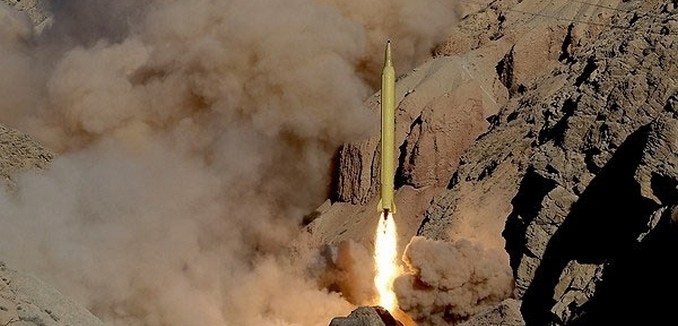The chief of staff of the Iranian Armed Forces boasted at a public ceremony that his country has provided the terrorist group Hezbollah with missile technology that enabled them to target Israeli civilians, the semi-official Fars News Agency reported Thursday.
“Iran established the missile industry for Syria in Aleppo in the past years and produced missiles and they were used during the 33-day war against Israel” in 2006, Maj. Gen. Mohammad Hossein Baqeri said.
He made his remarks at a memorial for 17 members of Iran’s Islamic Revolutionary Guard Corps (IRGC) who were killed in an explosion at a munitions depot in 2011. Among those who died were Gen. Hassan Tehrani Moqaddam, who headed Iran’s ballistic missile program.
Hezbollah reportedly now has an arsenal of 130,000 rockets, more than the combined total of all 27 non-U.S. NATO member states.
Hezbollah chief Hassan Nasrallah admitted in June that Iran provided his terrorist group with everything it needed. “We are open about the fact that Hezbollah’s budget, its income, its expenses, everything it eats and drinks, its weapons and rockets, are from the Islamic Republic of Iran,” said Nasrallah, who insisted that the Lebanese terrorist organization “will not be affected” by the recently imposed sanctions against his group. “As long as Iran has money, we have money… Just as we receive the rockets that we use to threaten Israel, we are receiving our money. No law will prevent us from receiving it,” he added.
Nasrallah’s acknowledgement of Iranian aid seems to confirm a public assurance given to him in August 2015 by Iranian Foreign Minister Mohammad Javad Zarif that the nuclear deal presented “a historic opportunity” to confront Israel. Iran recently announced that its defense spending would increase by 90% in the coming year.
According to a July report published by the Foundation for Defense of Democracies, Israeli officials believe that any future war with Hezbollah has the potential to cause “thousands of civilian deaths” in Israel. Hezbollah has, among other things, threatened to attack ammonium tanks in Haifa, which could kill tens of thousands of people.
The think tank’s vice president for research, Jonathan Schanzer, explained that Hezbollah’s widely-reported tactic of hiding military assets in civilian areas would also lead to mass casualties. Reports emerged two years ago that Hezbollah was offering reduced-price housing to Shi’ite families who allowed the terrorist group to store rocket launchers in their homes. An Israeli defense official told The New York Times in May 2015 that the buildup of Hezbollah’s terror infrastructure in southern Lebanese villages meant that “civilians are living in a military compound” and that their lives were at risk. A few days later, a newspaper linked to Hezbollah bolstered the Israeli assessment.
Nasrallah’s comments also called into question assurances made by Secretary of State John Kerry that the U.S. would ensure that Iran could not arm Hezbollah after lifting nuclear-related sanctions against Tehran. “Our primary embargo is still in place,” Kerry said at a Senate hearing last year. “We are still sanctioning them. And, I might add, for those things that we may want to deal with because of their behavior, for instance, Hezbollah, there is a UN resolution, 1701, the prevents the transfer of any weapons to Hezbollah. That will continue and what we need to do is make sure that we’re enforcing it.”
While UN Security Council Resolution 1701, which was passed unanimously to end the 2006 war, forbids the arming of Hezbollah, Iran has continued to send the terrorist group weapons and the Security Council has refused to enforce it.
[Photo: Fars News ]




